You are viewing our site as an Agent, Switch Your View:
Agent | Broker Reset Filters to Default Back to List7 Big Implications of Computer Vision for Real Estate
September 18 2023
Having worked in computer vision for the past five years, I've had a lot of time to think about the implications for real estate. I've been fortunate to speak to dozens of highly innovative companies across the entire real estate spectrum on the possibilities it unlocks and the challenges it solves. Despite computer vision becoming more readily adopted, I can't help but feel we're only scratching the surface of its possibilities.
Untapping the potential
When many people think of computer vision, they think of a technology that identifies things in a photo. Cool, maybe. A party trick, perhaps. But any real estate professional can also instantly identify items in an image. The true value of computer vision lies in being able to do this at scale, literally thousands of photos, instantly, across entire markets.
Understanding its impact
Imagine, as a real estate agent, you could personally visit and evaluate every property in your market. But that's a pipe dream, right? The logistics of doing this are so preposterous it's something an agent would never even consider.
The closest comparison to what computer vision can accomplish may be akin to a seasoned agent with more than 30 years of experience. A real estate veteran intimately knows the ins and outs of their local area, how things have evolved, and what a good deal looks like. However, even their breadth and depth of knowledge are imperfect. And despite their massive experience, most agents only have seen a fraction of the properties in their markets.
Enter the game-changer
AI and computer vision provide the ability to do this at scale. Computer vision can analyze every single property in a market, in real time, and on a continually updated basis. Moreover, it can track the outliers, identify the trends, deeply understand the data, and, most amazingly, return actionable, easy-to-consume, information. These impactful insights can help agents connect their buyers with their dream homes faster.
1. Tangible applications
If this still sounds a bit abstract, let's provide a few examples of the vast capabilities of computer vision. Imagine you're looking at a beautiful home that's priced a bit cheaper than you'd expect. You decide to visit it. But after you drive through the neighborhood, you realize it's by far the nicest home in the area.
Computer vision could save you a tank of gas or a charge. Analyzing imagery could instantly show you how the homes you want to see compare in quality and condition to other homes in the neighborhood, ZIP code, or city. Think of what this means if an agent could do this for every home on the market!
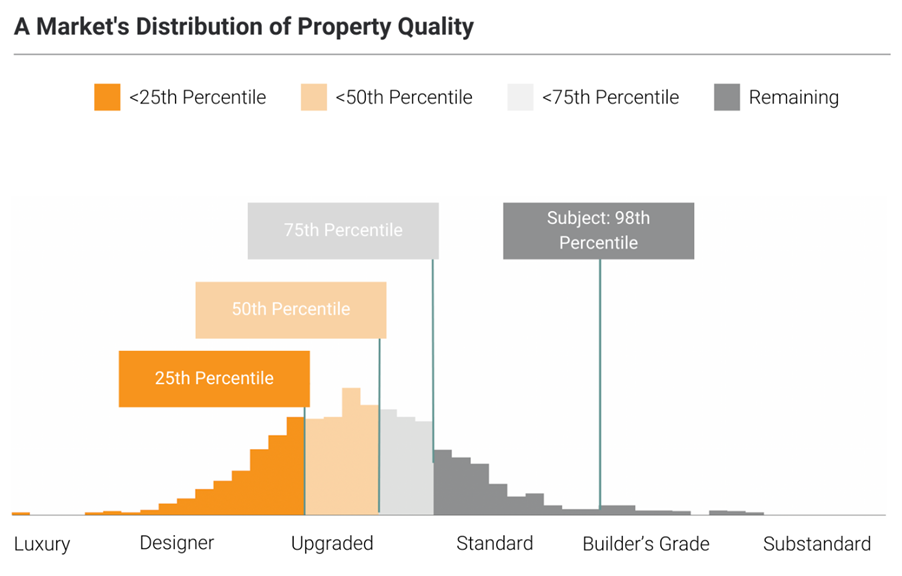
2. Doing more
Let's say you have a client looking for a modern home. Searching by styles for homes listed in the MLS is notoriously inconsistent. Computer vision can fix that. Imagine being able to tell your client that, on average, only three modern homes are sold in the area they want to live each quarter and that only one is currently on the market. Imagine the time you could save by having this information at the beginning of their search. Knowing this data empowers agents instantly, allowing them to communicate these facts with certainty and helping clients adapt their search process accordingly.
Imagine you just read a story featuring five interior design experts who all believe dark countertops are going out of style. However, your background in real estate has taught you real estate is hyperlocal, and that may or may not be true for your market. But do you know for sure what the trend is in your market? Computer vision can unlock this information for you.
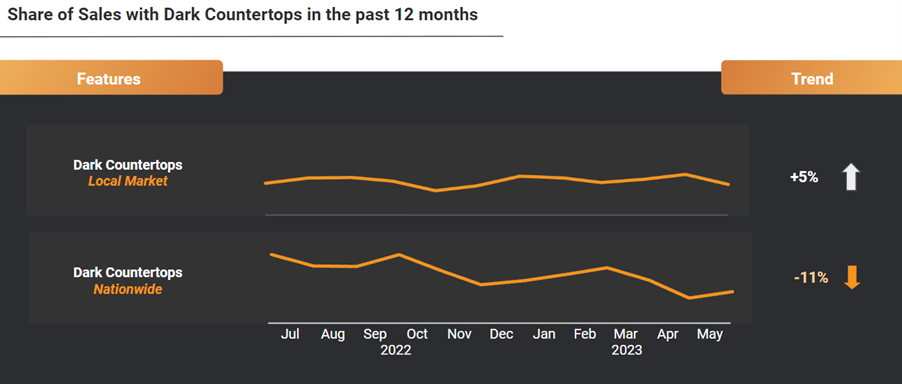
3. Data integrity and reliability
Many professionals in the real estate industry and other business sectors today ask the same question, "What if AI is wrong?"
That's a great question, but it needs to be put in context. It's important to frame this question by considering how we use data to make real estate decisions.
Agents know from real-world experience that public records are inconsistent, unstandardized, and may contain outdated information. Aggregated across 3,000+ counties in the US, certain data points may be partially complete in some markets and completely blank in others.
Multiple listing services or MLS data is much cleaner. But even then, MLS data isn't perfect and has its limitations. As an agent is marketing the listing, undesirable characteristics may be left out or features embellished. In particularly hot markets, many agents may only populate the MLS's required fields. Even when populated perfectly, data across MLSs isn't perfectly standardized.
These gaps, or inconsistencies in traditional datasets, make it incredibly hard to build models or provide insights at scale. There is just too much noise.
4. Solving multiple problems
On the other hand, computer vision can scan every image of every property. It can consistently define how variables are treated. Is a stoop a porch? Is a 6-foot by 6-foot cement landing a small patio?

While there are a finite number of property details in public records or an MLS listing, computer vision isn't limited to the details that have been traditionally recorded. Looking for an L-shaped kitchen that opens to the living room? Computer vision can see it. Are you interested in homes with red cabinets and Viking appliances? No problem.
When it comes to more subjective elements such as a home's style, desirable views, condition or quality, AI can provide a consistent framework to compare different properties to one another. What does this mean? Rather than relying on a local market average price per square foot estimate, you can understand the exact impact a home's condition can have on its price.
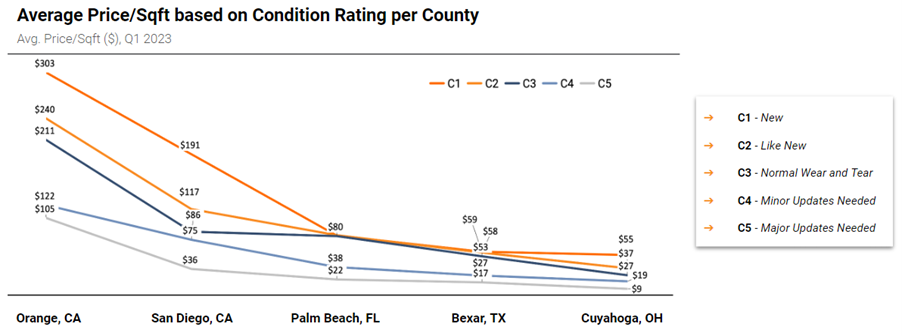
In short, computer vision enables the most structured, consistent, and complete dataset that has ever been available.
5. Untapped potential
Historically, data has often caused frustration, confusion, and misinterpretation. American humorist Mark Twain popularized it this way: there are "Lies, damn lies, and statistics!"
But I believe computer vision has changed the game. We now have an opportunity to extract data and examine nearly limitless possibilities that computer vision can unlock at scale.
For example, imagine being able to track the images a user interacts with or lingers on to understand what they're genuinely interested in. Amazon, Instagram, and Facebook are already doing this.
Imagine an agent meets with a potential home seller. Because of computer vision, the agent can tell the seller that there is an abnormal lack of properties like their current home and that it would likely sell for a 10% premium if they listed now.
What seller doesn't want to maximize their sale price? Imagine an agent telling a homeowner that a zero out-of-pocket presale renovation could net them an additional $100,000 to $125,000 more if they made improvements before they list. That's what Revive's new Vision AI offers agents.
Or if an agent could show a buyer the post-renovation value of three homes they're considering, with an estimated 50k renovation budget yielding an increase in equity of $100,000, $120,000, or $200,000, depending on the home they pick.
6. Broadening the scope
Computer vision can do more than help real estate agents and their buyers and sellers. The potential impact is just as striking in the appraisal, insurance, and mortgage industries.
Home age and roof age are common data points for valuations, but depending on many factors, such as climate, materials and use, homes, and their major components, can age differently.
Computer vision delivers the needed analysis with much greater granularity. For appraisers, the current measurement of property quality, known as the UAD quality scale, has six quality ratings, with 96.3% of properties falling within the middle two categories. AI can provide a scale across 50-plus quality ratings by examining each area of the home. Computer vision can identify and interpret the nuances, such as a renovated kitchen where the cabinets were replaced entirely versus simply repainted.
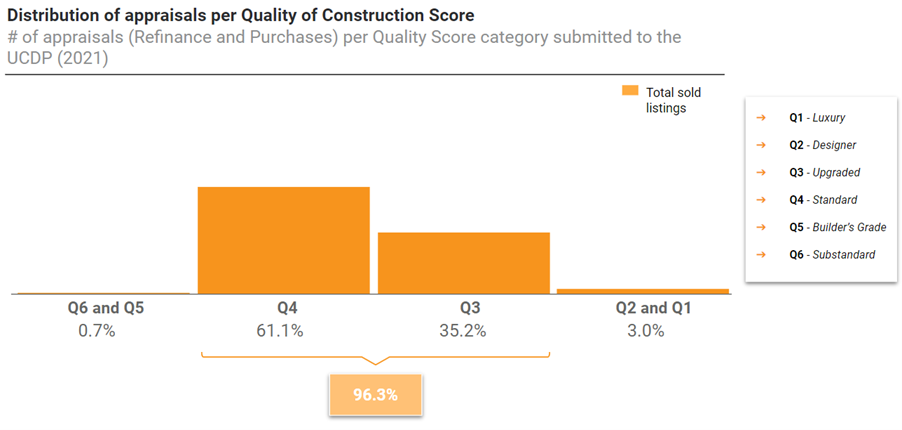
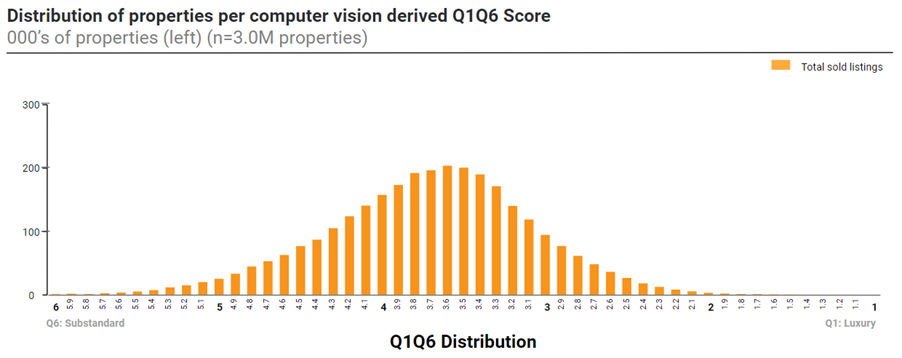
7. Accelerating the process
If you think about the typical processes performed for different real estate transactions, there are many hours wasted to simply find out that a property won't work out. For example, when agents search, they spend hours browsing irrelevant properties before selecting a small subset of homes that may work for their clients. Despite all that effort, their clients are always worried there's one hidden gem they may have missed.
Similarly, real estate investors spend precious hours performing due diligence on potential investments, but many of these opportunities are invalidated after the photos reveal details that were missing from the listing. Likewise, an appraiser painstakingly searches for comps, but it's only after they dive into the photos that they realize the properties are not a fit because of their differing conditions.
For all of these processes, AI changes the game. It doesn't reinvent the wheel, but it accelerates the process. I truly believe AI isn't here to replace what agents, appraisers, or investors are doing, but it can help get them 90% of the way there. Is it their best use of time to scroll through 50 photos to eventually discover the backyard sits adjacent to high tension power lines? AI sets real estate professionals up for success so they can provide their expertise and focus their time and energy on the smaller subset of properties worth their valuable time.
Embracing the change
Simply put, computer vision provides new possibilities that the industry is only beginning to realize. It generates insights that would've taken hours to develop and, in seconds, delivers real-time, relevant, and easy-to-digest data. It often affirms what agents already know, and when it surprises, it provides quantitative evidence to back up its insights.
For all the innovators out there, computer vision is opening the door to build a more efficient future for real estate.
Nathan Brannen is one of real estate's most experienced artificial intelligence veterans. He is the Chief Product Officer for Restb.ai, the leader in computer vision and AI for real estate.









